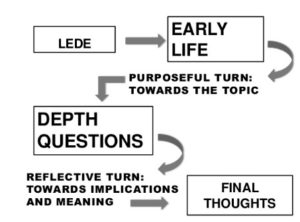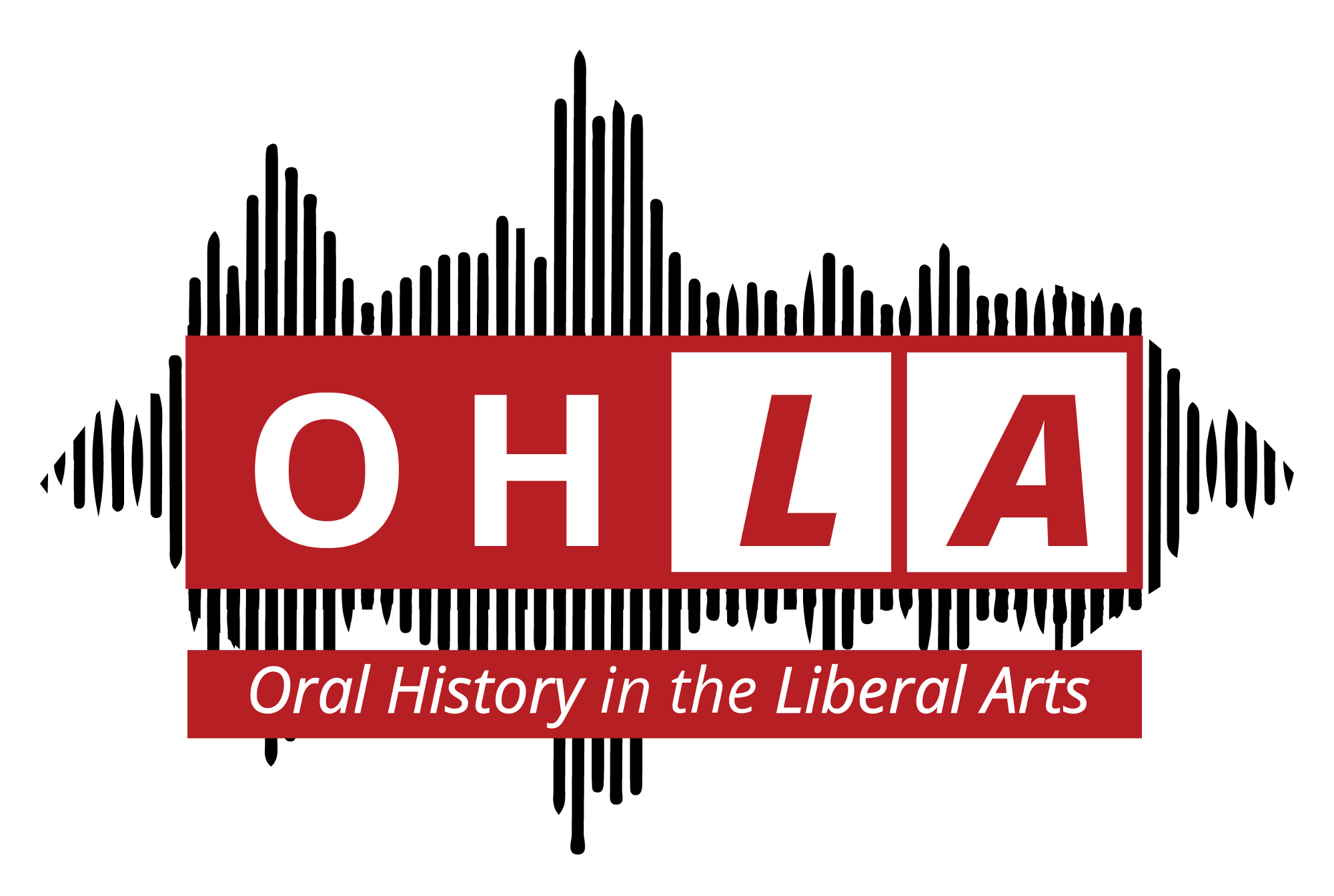A Great Lakes Colleges Association initiative supported by the Andrew W. Mellon Foundation
Quicklinks— Major Tutorials & Essays
OHLA Facilitates Replicable, “High Impact” Community Based Learning using Interview Methods, Digital Storytelling, and Digital Scholarship
Higher education is in a period of intense introspection and educators are striving to find new means to achieve greater outcomes and more deeply engage students in their educational experience. Across teaching-focused campuses, faculty are challenged to innovate and experiment with pedagogies outside or beyond the centuries-old lecture format (which research suggests too often fails to engage first-generation students and those from underserved communities) into something more interactive and immersive.
High Impact Pedagogies are Participatory
To make higher education more meaningful and experiential, the Association of American Colleges and Universities (AAC&U) recommends curricular development of “high-impact practices,” or HIP, to increase rates of student retention and student engagement. These recommendations include first-year seminars, collaborative projects, undergraduate research, community-based learning, and capstone projects.
While AAC&U has published a variety of rubrics and other literature as resources to support high impact practices, it maintains that “the utilization of active learning practices is unsystematic” on almost all campuses. OHLA’s mission is to develop a systematized, sustainable, supportive pedagogy for active, engaged learning that gets students out of the classroom and into the community. This applied and active learning builds crucial digital literacies through democratic knowledge construction and the creation of shared interview exhibits, while supporting the “soft skill” development of self comportment, applied ethics, and the ability to engage with others who may think differently than you— capacities small liberal arts colleges deem crucial.
Oral History as a High Impact Pedagogy
Oral History is generally defined as a methodology for conducting interviews, curating the result of those interviews, and making those interviews available for research, in accordance with the best practice guidelines established by the Oral History Association. Digital Scholarship is the process of using digital tools and platforms to investigate, arrange, and analyze oral histories, texts, data sets, and archival records. Digital Storytelling refers to the process of creating documentary stories for a public or chosen audience from a variety of digital source media— including archival imagery and edited narratives from oral history interviews.
OHLA’s site is a pedagogical resource presenting oral history as a robust interview methodology that, when combined with digital scholarship and storytelling, can be integrated into classroom and cooperative education curricula for rich community-based inquiry that is guided by a course’s subject matter. For brevity, the term “oral history” in this proposal refers to all of the above as an interconnected set of tools for high impact inquiry and engagement in undergraduate learning.
As such, rather than imagining an audience of oral history practitioners or digital humanists, the resources created by this initiative aim to be of broad use to all faculty considering engaging students in their local community or in communities of practice— the English instructor connecting themes in her American Literature course to contemporary migrant farm workers in the surrounding community; the chemist recording the social history of advancements in the field; the math instructor attempting to make geometry relevant to daily life; the student interning over summer term attempting a fieldwork research term in advance of their senior project sequence.
OHLA considers the broadest possible audience and engagement, and does not see the skills as the ends in themselves. OHLA sees oral history and digital storytelling/scholarship skills and methods as tools to animate learning outcomes, to drive curriculum towards innovation and participatory, high impact pedagogical strategies.
Selected Templates, Tutorials & Essays from OHLA’s Resource Hub
- Visit the OHLA homepage at ohla.info for a wide variety of resources and reflective essays written by participating OHLA faculty, students, digital librarians, and instructional technologists. Expect frequent new content— second year project teams are building their projects and resources currently behind the scenes, while third year project teams are just onboarding. We recommend scrolling the homepage or “Explore” at the upper left of the site.
- Locating our Practice is a series of essays written by faculty who discuss their disciplinary backgrounds, teaching and research interests, and how they came to engage in community-based learning with interview and digital tools. Start here for inspiration on how the OHLA method might impact your teaching and learning or structure the undergraduate research you support.
- Project Design: You can download and edit OHLA’s project statement, release form, and metadata log to use in your own project planning here, or view a sample OHLA microgrant application by OHLA co-director Ric Sheffield (Kenyon College) and a student interested in documenting Latinx experience at Kenyon here.
- Find out how OHLA co-director Brooke Bryan (Antioch College) uses the project statement and release form to structure her student’s projects, read up on the differences between informed consent and copyright release, and how to approach your campus IRB in the monumental post Interviewing 101: A few resources for teaching undergrads how to interview for public-facing digital projects. Within one term. This post includes resources to teach her Abbreviated Life Story Method that emphasizes managing the time-space of the interview and preparing a minimal number of deliberate questions.
- See through the eyes of undergraduates as they reflect and share advice for doing community-based interview projects like how to identify interviewees for an emergent project, reaching out to a potential interviewee by email, preparing for a good interview, and taking fieldnotes.
- Plan for what happens after the interview with Kenyon digital librarian Jenna Nolt’s toolkit providing a bird’s eye view of collecting metadata and managing files, consider what kind of digital tool might serve the project you’d like to build with this tool overview, and check out an innovative use of Excel for indexing interviews you want to work with but don’t wish to publish or archive. Jump into our massive collection of Oral History Metadata Synchronizer (OHMS) tutorials with the first of an Antioch student-produced video training series here, and consider how can OHMS can support the visualization and navigation of your bilingual projects here. Lean into Emily Yochim’s (Allegheny College) podcasting assignments and tutorials here.
- Visit, listen, and search within OHLA’s ongoing and emergent Faculty projects & Student Projects (more in development!)
Questions? Contact bbryan <@> antiochcollege.edu

